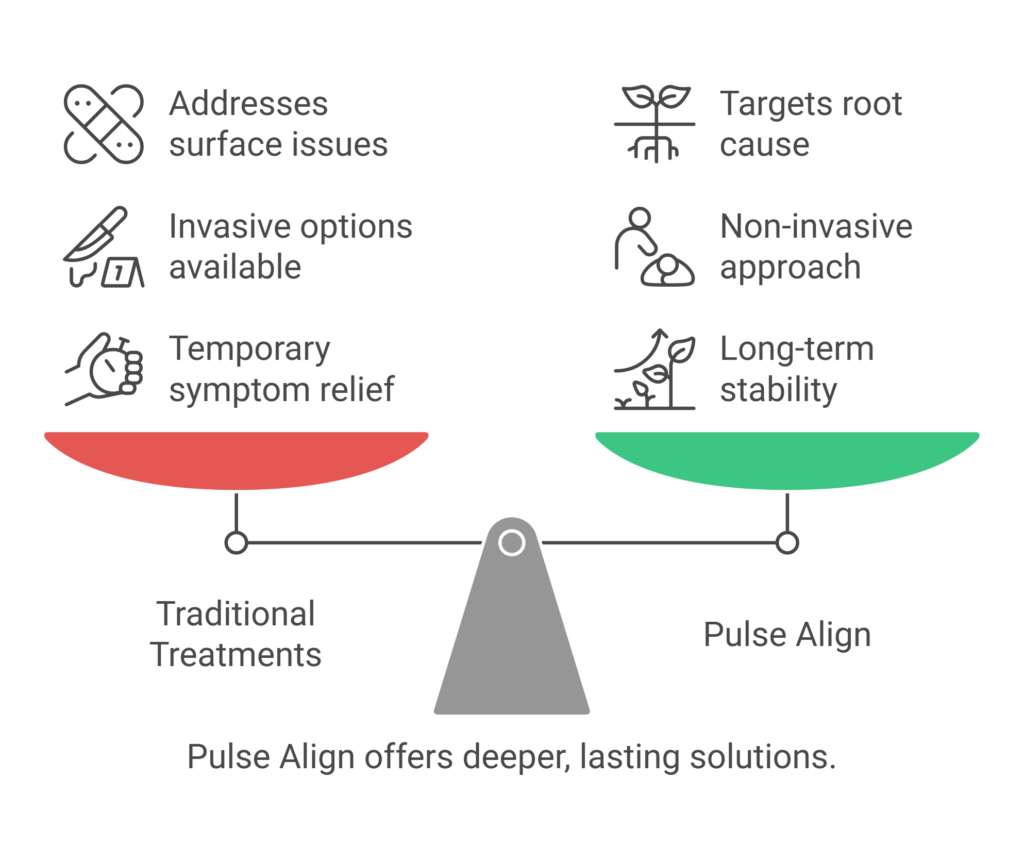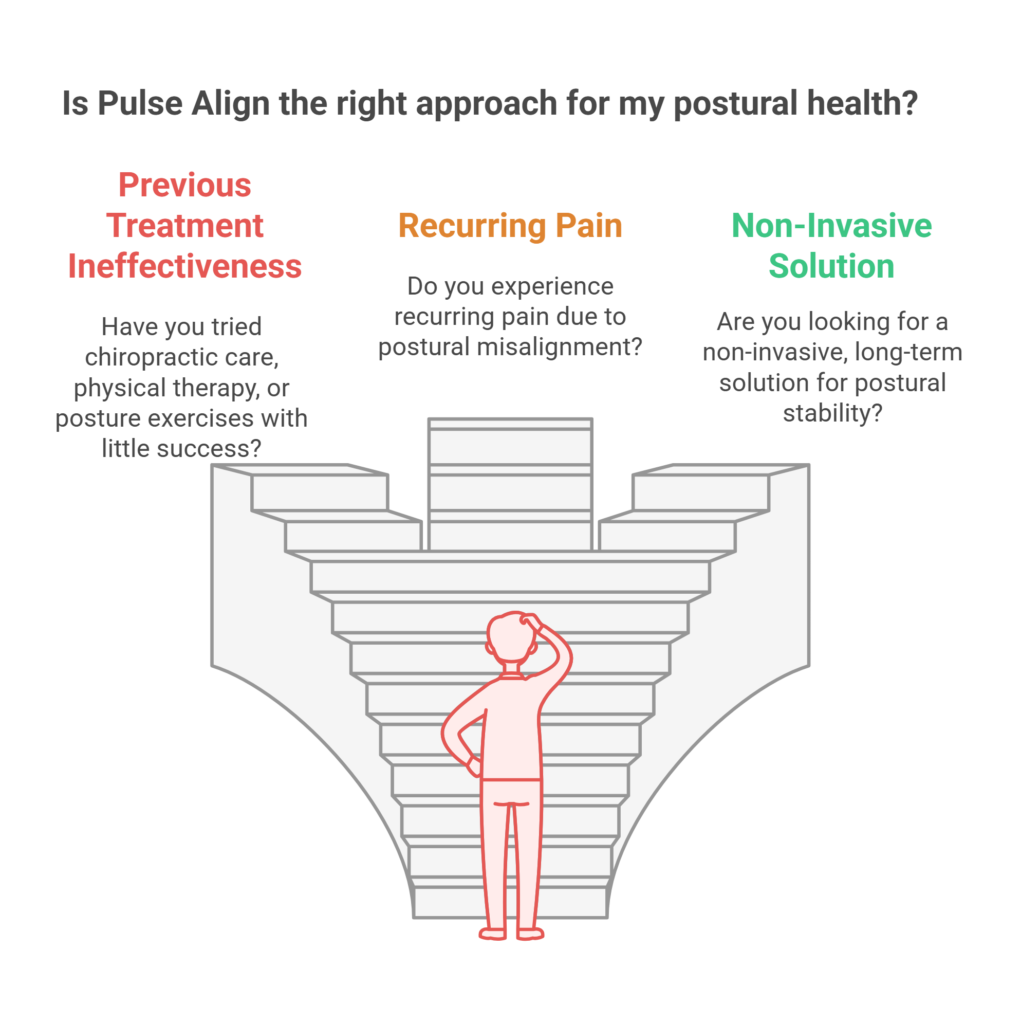What is Postural Imbalance? Understanding the Root Cause of Chronic Pain and Dysfunction
The Hidden Epidemic: Why Postural Imbalance is More Than Just Poor Posture
Postural imbalance is one of the most overlooked yet common musculoskeletal conditions, affecting people of all ages. Studies show that up to 80% of adults experience some degree of postural misalignment, leading to chronic pain, muscle fatigue, and joint dysfunction.
Unlike temporary discomfort, postural misalignment has long-term effects, disrupting the body’s natural biomechanics, neurological posture control, and functional symmetry. Over time, this misalignment increases stress on the spine, muscles, and nervous system, leading to conditions like chronic back pain, joint degeneration, and reduced mobility.
Causes of Postural Imbalance
Postural imbalance doesn’t happen overnight—it develops due to a combination of lifestyle habits, muscle dysfunction, and neurological imbalances. Some of the most common causes include:

Common Types of Postural Imbalance & How They Affect Daily Life
Depending on its severity, postural imbalance can manifest in different ways, each affecting movement, spinal stability, and neuromuscular function.
When left untreated, postural dysfunction leads to:



Traditional approaches like chiropractic adjustments, physiotherapy, and corrective exercise can help, but they don’t always address the neurological root cause of postural dysfunction.
Unlike conventional treatments, Pulse Align uses neuromodulation for posture correction to retrain the nervous system and restore functional symmetry naturally.
- Non-invasive & drug-free: No forceful manipulations or medications.
- Targets neurological posture control: Rebalances spinal alignment and muscle coordination.
- Supports long-term postural stability: Works with the body’s natural healing mechanisms.

Traditional Postural Imbalance Treatments and Their Limitations
Why Standard Approaches to Postural Imbalance Often Fall Short
For decades, individuals suffering from postural imbalance have turned to conventional treatments such as physical therapy, spinal manipulation, medication, and even surgery. While these methods offer some relief, they often fail to address the root cause of the problem—neurological posture control and functional symmetry.
Many people seek solutions for chronic pain, spinal misalignment, and muscle imbalance but find themselves stuck in a cycle of temporary relief and recurring symptoms. Let’s examine the common postural imbalance treatments, their benefits, and their critical limitations.
Physical therapy focuses on strengthening weak muscles, stretching tight muscles, and improving postural alignment through targeted exercises. Techniques may include:








This type of care focuses on spinal alignment to relieve pressure on joints, nerves, and muscles. Common techniques include:






Doctors often prescribe pain relievers and muscle relaxants to reduce discomfort caused by poor posture and muscle imbalance.



In rare cases, doctors recommend surgical intervention to correct severe spinal misalignment or nerve compression due to postural imbalance.



Comparison of Traditional Postural Imbalance Treatments
| Treatment Type | Benefits | Limitations |
| Physical Therapy | Strengthens weak muscles, improves flexibility, corrects movement patterns. | Slow progress, requires long-term commitment, does not address neurological posture control. |
| Spinal Manipulation | Relieves joint pressure, improves spinal alignment, reduces muscle tension. | Temporary relief, frequent adjustments needed, does not retrain the nervous system. |
| Medication | Provides temporary pain relief, reduces inflammation. | Does not correct postural misalignment, risk of dependency, side effects like nausea or liver damage. |
| Surgery | Can correct severe spinal misalignments, relieves nerve compression. | Invasive, long recovery time, expensive, and may not fully restore functional symmetry. |
Why Traditional Treatments Fail to Solve Postural Imbalance
Despite their benefits, these traditional approaches do not address the neurological root cause of postural misalignment.

The body maintains posture and balance through a complex interaction between the nervous system, muscles, and joints. Traditional treatments focus on the symptoms, but fail to correct the neurological patterns responsible for chronic misalignment.
The Missing Piece: Neuromodulation for Postural Imbalance
New research shows that neuromodulation-based treatments, like Pulse Align, can help retrain the nervous system to naturally correct postural imbalances.
Unlike spinal manipulation, physical therapy, or medication, Pulse Align:



Benefits of Align for Postural Imbalance CorrePulse ction
Why Pulse Align is a Game-Changer for Postural Health
Postural imbalance is more than just poor posture—it’s a neuromuscular dysfunction that affects spinal alignment, muscle coordination, and overall mobility. Left untreated, it can lead to chronic pain, joint stiffness, reduced flexibility, and even nerve compression.
Unlike traditional treatments that focus only on symptom relief, Pulse Align corrects postural misalignment at its core by restoring neurological posture control and functional symmetry. This non-invasive, drug-free solution delivers long-term results by retraining the nervous system and enhancing the body’s natural ability to maintain proper posture.


- Targets the root cause of pain by optimizing neuromuscular balance.
- Reduces spinal misalignment and muscle tension that contribute to chronic discomfort.
- Helps alleviate pain associated with forward head posture, rounded shoulders, and excessive lumbar lordosis.
Studies show that up to 70% of chronic pain cases are linked to poor postural alignment. By correcting functional asymmetry, Pulse Align reduces pain intensity and frequency without relying on medications or invasive treatments.
- Enhances joint range of motion by restoring postural balance.
- Prevents muscle stiffness and joint restrictions caused by postural misalignment.
- Strengthens core stability and spinal support for greater movement efficiency.
“After using Pulse Align, I noticed a dramatic improvement in my flexibility and overall movement. My posture feels natural again, and I no longer struggle with stiffness after long work hours!”: James R., Office Worker
- Accelerates muscle re-education through calibrated pulse vibrations.
- Promotes faster adaptation of the nervous system to correct poor posture habits.
- Reduces recovery time for those suffering from long-term postural misalignment.
A study comparing Pulse Align with traditional physical therapy showed that patients using Pulse Align experienced 40% faster postural correction and 50% less recurrence of postural imbalances over time.
- Re-educates the nervous system to maintain natural postural alignment.
- Improves proprioception (body awareness), helping individuals self-correct poor posture.
- Restores functional symmetry, reducing compensatory movement patterns that cause pain.
Most traditional treatments only address muscle strength, ignoring the neurological aspect of posture control. Pulse Align’s neuromodulation technology ensures that postural corrections last longer by fixing neuromuscular imbalances at their source.
- Prevents future postural misalignment by reinforcing proper muscle activation patterns.
- Helps maintain optimal spinal alignment, reducing the risk of chronic back and neck pain.
- Supports long-term musculoskeletal health by promoting functional symmetry.
People with corrected postural alignment are 50% less likely to develop chronic pain conditions compared to those who rely solely on spinal manipulation or physical therapy.
Why Pulse Align Outperforms Traditional Postural Correction Methods
| Benefit | Pulse Align | Spinal Manipulation | Physical Therapy | Medication |
| Pain Reduction |  Targets neuromuscular dysfunction Targets neuromuscular dysfunction |  Temporary relief Temporary relief |  Strengthens muscles Strengthens muscles |  Only masks symptoms Only masks symptoms |
| Improved Mobility |  Enhances joint flexibility Enhances joint flexibility |  Short-term results Short-term results |  Increases range of motion Increases range of motion |  No mobility improvement No mobility improvement |
| Faster Recovery |  Speeds up neurological adaptation Speeds up neurological adaptation |  Requires frequent visits Requires frequent visits |  Slow progress Slow progress |  No effect on posture correction No effect on posture correction |
| Postural Stability |  Re-trains nervous system Re-trains nervous system |  Does not address posture control Does not address posture control |  Requires continuous practice Requires continuous practice |  No impact on posture alignment No impact on posture alignment |
| Non-Invasive |  Drug-free, painless Drug-free, painless |  Manual force applied Manual force applied |  Exercise-based Exercise-based |  May cause side effects May cause side effects |
Final Thoughts: The Future of Postural Imbalance Treatment
Unlike traditional postural treatments that focus on short-term fixes, Pulse Align offers a long-term, science-backed approach to posture correction and spinal health.Drug-free & non-invasive: No medication or painful adjustments.
Works with the body’s natural postural reflexes: Retrains the nervous system for lasting posture correction.
Fast, effective, and clinically proven: Backed by research showing superior results over traditional methods.
Pulse Align vs. Traditional Treatments: A Comprehensive Comparison
Why Pulse Align is Redefining Postural Imbalance Treatment
For years, individuals struggling with postural imbalance, spinal misalignment, and chronic pain have relied on traditional treatments like spinal manipulation, physical therapy, and medication. While these methods provide temporary relief, they often fail to correct the underlying neurological dysfunction responsible for poor posture and muscle imbalances.
Pulse Align offers a revolutionary approach that targets the neuromuscular system to provide long-lasting improvements in postural health, spinal alignment, and functional symmetry. Unlike conventional treatments, which focus on symptom management, Pulse Align re-trains the body’s natural posture control system, leading to sustained benefits without the need for ongoing interventions.
Pulse Align vs. Traditional Treatment Methods
To help you understand how Pulse Align compares to other postural imbalance treatments, here’s a detailed comparison:
| Treatment Method | How It Works | Effectiveness | Limitations | Pulse Align Advantage |
| Pulse Align (Neuromodulation Therapy) | Uses calibrated pulse vibrations to stimulate neuromuscular pathways, restoring functional symmetry and postural balance. |  Long-term posture correction, strengthens neurological posture control. Long-term posture correction, strengthens neurological posture control. | None—completely non-invasive, drug-free, and painless. | Addresses the root cause of postural misalignment by retraining the nervous system. |
| Spinal Manipulation | Uses manual spinal manipulation to correct misalignment. |  Immediate relief, but requires frequent adjustments. Immediate relief, but requires frequent adjustments. |  Does not correct muscle imbalances or retrain posture control. Does not correct muscle imbalances or retrain posture control. | Pulse Align provides lasting improvements without the need for repeated adjustments. |
| Physical Therapy | Strengthens weak muscles, improves flexibility, and promotes postural awareness. |  Improves muscle function, but requires long-term commitment. Improves muscle function, but requires long-term commitment. |  Does not address neurological dysfunction—relies on voluntary muscle training. Does not address neurological dysfunction—relies on voluntary muscle training. | Pulse Align works at the neurological level, making it faster and more effective than exercises alone. |
| Medication (Painkillers, Muscle Relaxants) | Reduces inflammation and pain, providing temporary relief. |  Only masks symptoms—does not fix postural imbalances. Only masks symptoms—does not fix postural imbalances. |  Can cause dependency and side effects. Can cause dependency and side effects. | Pulse Align is a drug-free alternative that targets the root cause instead of just numbing pain. |
| Surgery | Corrects severe spinal deformities through invasive procedures. |  Effective for extreme cases, but only recommended when other treatments fail. Effective for extreme cases, but only recommended when other treatments fail. |  High risk, long recovery time, expensive, and not always necessary. High risk, long recovery time, expensive, and not always necessary. | Pulse Align offers a non-surgical alternative to restore postural balance naturally. |
Common Types of Postural Imbalance & How They Affect Daily LifeKey Advantages of Pulse Align Over Traditional Treatments
Final Thoughts: Why Pulse Align is the Future of Postural Correction
Unlike traditional methods that focus on short-term relief, Pulse Align provides a long-term, science-backed approach to posture correction and spinal health.Drug-free & non-invasive: No medication or painful adjustments.
Works with the body’s natural postural reflexes: Retrains the nervous system for lasting posture correction.
Fast, effective, and clinically proven: Backed by research showing superior results over traditional methods.
Is Pulse Align Right for You?
Who Can Benefit from Pulse Align?
If you struggle with chronic postural imbalance, spinal misalignment, or neuromuscular dysfunction, you may have already tried traditional treatments like Spinal manipulation, physical therapy, or posture exercises—only to find that your symptoms return over time.
Pulse Align offers a breakthrough solution that corrects postural misalignment at its source by retraining the nervous system. Unlike temporary fixes, Pulse Align helps the body restore functional symmetry and long-term postural stability naturally.

You May Benefit from Pulse Align If You:
Who Should Avoid Pulse Align?
While Pulse Align is safe, non-invasive, and drug-free, there are certain cases where it may not be suitable:
How to Determine if Pulse Align is Right for You
If you’re unsure whether Pulse Align is the right approach for your postural health, ask yourself:




Why Pulse Align is a Game-Changer for Postural Health
Unlike traditional chiropractic adjustments, physical therapy, or medication, Pulse Align provides:




Finding a Pulse Align Practitioner
If you’re ready to experience the transformative benefits of Pulse Align for neck pain relief, the next step is connecting with a qualified practitioner. With a growing network of professionals trained in neuro-modulation technology, finding the right expert to guide your journey is easier than ever.
How to Locate a Pulse Align Practitioner
- Search Online Directories:
- Visit the official Pulse Align website to access a directory of certified practitioners near you.
- Use search terms like “Find a Pulse Align practitioner near me” to locate options in your area.
- Contact Local Clinics:
- Many chiropractic and physical therapy clinics now offer Pulse Align therapy as part of their services.
- Inquire about their expertise in treating conditions like chronic neck pain, text neck, or whiplash injuries.
- Check Credentials:
- Ensure your practitioner is certified in calibrated pulse vibration therapy and has experience in managing neuromuscular harmony.
- Read Reviews and Testimonials:
- Look for feedback from past clients to gauge the practitioner’s success rate and approach.
- Reviews mentioning natural neck pain relief and improved mobility can offer valuable insights.
Why Work with a Certified Practitioner?
Certified Pulse Align practitioners are trained to:
- Customize treatments based on individual pain points and neuromuscular imbalances.
- Use precise calibrated pulse vibrations to restore muscle balance and promote healing.
- Monitor progress and ensure that therapy aligns with your long-term wellness goals.
Conclusion: Transform Your Postural Health with Pulse Align
Key Takeaways: Why Pulse Align is the Future of Postural Imbalance Correction
Postural imbalance is more than just an aesthetic concern—it’s a neuromuscular dysfunction that can lead to chronic pain, spinal misalignment, reduced mobility, and long-term health complications. Traditional treatments like chiropractic adjustments, physical therapy, and pain medications may offer temporary relief, but they fail to address the root cause of poor posture and muscle imbalance.
Pulse Align provides a revolutionary solution that reprograms the nervous system to correct postural misalignment at its source. By utilizing neuromodulation therapy, Pulse Align restores functional symmetry, improves neurological posture control, and enhances overall postural health—all without invasive procedures or medication.
Why Choose Pulse Align?






Read our most recent publications
Frequently Asked Questions about Posture Imbalance
Posture Imbalance, body misalignment
- What is postural imbalance?Postural imbalance is an alteration in the body’s natural alignment, which may cause uneven weight distribution, muscle tension, and pain.
- What are common signs of body misalignment?Uneven shoulders, a tilted pelvis, abnormal spinal curvature, or a head leaning forward may indicate misalignment.
- What are common causes of postural imbalance?Causes include poor prolonged posture, a sedentary lifestyle, injuries, muscular or skeletal asymmetries, and carrying inappropriate loads.
- How does body misalignment affect health?It can cause chronic pain, muscle fatigue, reduced mobility, headaches, and a decreased quality of life.
- Can stress contribute to postural imbalance?Yes, stress can increase muscle tension and encourage poor posture, thereby worsening postural imbalance.
- How does a physical therapist evaluate body misalignment?They perform a visual posture assessment, mobility and strength tests, and gait observation to identify deviations.
- Can I correct postural imbalance at home?Yes, targeted exercises, stretching, massage, and being mindful of your daily posture can help, but professional guidance is recommended.
- Which exercises help improve body alignment?Core strengthening, planks, yoga, Pilates, and postural stretches are particularly beneficial.
- Can wearing orthotics help correct postural imbalance?Yes, in some cases, orthopedic insoles or braces can help balance the body and reduce compensatory posture patterns.
- How long does it take to improve misalignment?The timeframe varies depending on severity. With consistent effort, it may take a few weeks to a few months to see significant improvements.
- Can postural imbalance cause joint pain?Yes, poor alignment places uneven stress on joints, which can lead to inflammation, stiffness, and joint pain.
- Can children suffer from postural imbalance?Yes, heavy backpacks, poor posture habits, and rapid growth can lead to imbalance in children.
- Does footwear choice affect posture?Absolutely, inappropriate shoes can alter foot biomechanics, affecting overall posture and body alignment.
- Can weight training help correct posture?Yes, if you strengthen all muscle groups evenly—especially core and back muscles—and use proper technique.
- Are massages helpful for improving body alignment?Massage can relax tense muscles, improve circulation, and facilitate postural adjustments, especially combined with targeted exercises.
- Can postural imbalance cause fatigue?Yes, maintaining poor posture requires more muscular effort, leading to increased fatigue throughout the day.
- Does office work contribute to misalignment?Often, yes. Sitting for long hours in front of a screen can lead to a forward head position, rounded shoulders, and other postural issues.
- Are proprioception exercises useful?Yes, they help improve body awareness, balance, and coordination, which promote better posture.
- What’s the difference between postural imbalance and scoliosis?Postural imbalance involves poor load distribution and is often reversible, while scoliosis is a structural deformity of the spine.
- Can postural imbalance be prevented?Yes, by maintaining proper posture, exercising regularly, and ensuring good workplace ergonomics, you can help prevent it.
- Do endurance sports promote better posture?Some sports like swimming or yoga improve overall muscle tone and support better postural alignment.
- How does breathing influence posture?Proper diaphragmatic breathing supports the trunk and improves alignment, while shallow breathing can increase tension.
- Is it helpful to see an osteopath for misalignment?Yes, an osteopath can realign structures, relieve tension, and recommend appropriate postural exercises.
- Does being overweight affect posture?Yes, excess weight, especially around the abdomen, can shift the body’s center of gravity and increase joint strain.
- Can postural imbalance cause digestive issues?In some cases, poor posture can compress internal organs and influence digestion, causing discomfort and bloating.
- Do relaxation techniques help correct posture?Yes, techniques like meditation or yoga relax muscles, reduce stress, and encourage better body awareness.
- Can postural imbalance be measured objectively?Tools such as foot scans, gait analysis, posture photography, and certain apps can objectively assess alignment.
- Can dancing improve posture?Dancing, particularly ballet, encourages an upright posture, better balance, and increased body awareness.
- Do sit-stand desks help reduce imbalance?Yes, alternating between sitting and standing reduces static tension and supports better overall alignment.
- How do I know if I have a postural imbalance?Recurring pain, feelings of tightness, difficulty maintaining an upright posture, and visual observation can indicate imbalance.
- Can you correct postural imbalance at any age?Yes, while it’s easier when younger, proper exercises and professional support can help at any stage of life.
- Is the Pilates method recommended?Yes, Pilates builds core strength, improves stability, and can gradually correct postural problems.
- Does body misalignment affect sports performance?Yes, poor posture limits mobility, strength, and coordination, potentially harming performance and increasing injury risk.
- How can I adapt my workstation to improve posture?Adjust chair height, position the screen at eye level, use a footrest, and ensure forearms are parallel to the floor.
- Do morning stretches help?Yes, gentle morning stretches relax muscles, prepare the body for the day, and help maintain better posture.
- Why are core muscles so important?Core muscles support the spine, stabilize the pelvis, and are essential for maintaining proper overall alignment.
- Can mobile apps help improve posture?Yes, some apps offer reminders, exercises, and visual assessments to help correct posture.
- Can poor posture cause jaw pain?Yes, improper head and neck alignment may create tension in the jaw, leading to pain or TMJ issues.
- Are regular breaks at work useful?Absolutely, taking breaks to stand, stretch, and move helps reduce tension and improve long-term posture.
- Can yoga prevent postural imbalance?Yes, yoga improves flexibility, strength, and body awareness, helping prevent and correct imbalance.
- Are older adults more prone to misalignment?With age, bone density loss, reduced muscle mass, and inactivity can lead to increased postural problems.
- How often should I do postural exercises?Ideally 3 to 5 times a week, depending on the program, for long-lasting improvements.
- Can a mirror help correct my posture?Yes, observing yourself in a mirror helps identify asymmetries and adjust your position in real-time.
- Can postural imbalance cause sleep disturbances?In some cases, muscle tension and associated pain can disrupt sleep.
- Are back strengthening exercises alone enough?No, it’s important to also strengthen the abdominals, hips, shoulders, and legs to maintain overall muscle balance.
- Can meditation improve posture?Yes, meditation promotes relaxation, better body awareness, and focus, which can indirectly enhance posture.
- Should I consult a professional before starting exercises?It’s recommended, especially if you have chronic pain, to receive a tailored program and prevent injury.
- Is strengthening the deep muscles crucial?Yes, deep stabilizing muscles of the spine are vital for lasting alignment and a healthy posture.
- Is poor phone posture problematic?Yes, looking at your phone with your head tilted forward for long periods can cause neck pain and postural imbalance.
- Can I use a posture-correcting belt?A posture belt can provide temporary support, but addressing the root causes and strengthening muscles is key for lasting results.
- How do I maintain achieved progress?Continue exercising, stay attentive to daily posture, and have regular check-ups with a professional.
